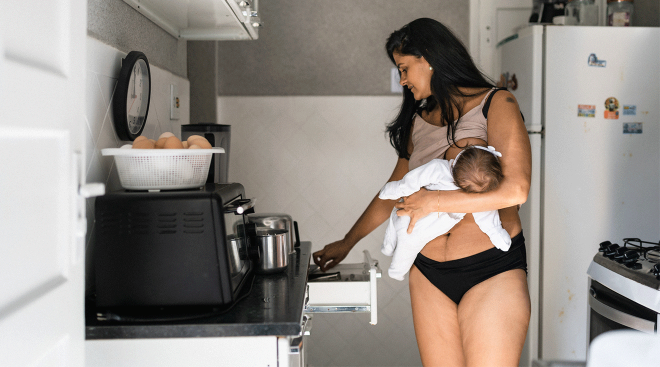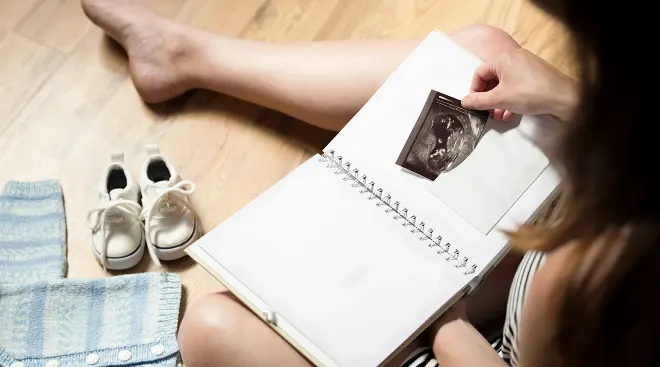- Taking a road trip? Plan for pee breaks—lots of them. Heck, you’re going to have to go often even if you’re just lounging around. Expect to get up in the middle of the night for potty trips. Consider this training for waking with a newborn.
- Even if you don’t have to go to the bathroom a million times each night, sleep may still be lacking. Insomnia is common at this point in pregnancy. Use that pregnancy pillow to get comfortable and try to relax as best as you can.
- You may have gained 20+ pounds at this point in pregnancy. And while your belly might feel stretched to capacity, there's even more growing to do!
- Baby is putting a lot of pressure on all sorts of organs leading to lots of unpleasantness. Don’t be surprised if you start experiencing pelvic pain or hemorrhoids.
Week 29 of pregnancy is a good time to start finalizing details, like stocking the nursery with baby care essentials. You’ll also want to start packing a bag with the things you know you’ll want with you at the hospital for baby’s birth. Leave it by the door, so you can add items you think of along the way—and so you can grab it at a moment’s notice.
Baby is getting a little cramped in there—that’s a given, seeing how fast they’re growing. That means all those kicks and jabs are getting stronger. You might even feel a subtle, repetitive twitch. That’s your week 29 fetus hiccuping.
The regular rhythmic patter of baby’s hiccups can get annoying, but it may also be reassuring: Hiccups seem to be linked to practice breathing—which baby is doing frequently now. (That said, baby’s inhaling amniotic fluid, not air; the placenta is responsible for providing oxygen from now until birth.) In fact, some research suggests that hiccups may help newborns develop important connections between the brain and the diaphragm, the muscle responsible for breathing.
Around week 29 of pregnancy, baby’s bone marrow begins producing red blood cells. Red blood cells are baby’s lifeline, carrying oxygen to all of the body’s tissues and shuttling out carbon dioxide. At the very beginning of pregnancy, baby’s red blood cells were produced by the yolk sack (which performed many critical functions until the placenta and other organs were developed enough to step in). From week 7 of pregnancy to now, the liver churned out most red blood cells.
BTW, if you’re 29 weeks pregnant with twins, your twosome is definitely getting super crowded inside your 29 weeks pregnant belly!
How big is baby at 29 weeks?
At 29 weeks, baby is the size of an acorn squash. Your 29 weeks baby already measures about 15.2 inches long. A 29 week fetus weighs about 2.5 pounds but still has a way to go—can you believe baby will triple in weight before birth?
A look at baby at 29 weeks in the womb
If you could see in your 29 weeks pregnant belly, you’d see that baby is filling out! Their skin is thicker, they’re putting on muscle and fat and (though you can’t see it) their bones are getting stronger too. Baby’s wrinkly skin is smoothing out, and their eyes now have pigment.
29 weeks pregnant is how many months?
Twenty-nine weeks pregnant is seven months pregnant. Keep in mind, though, that most doctors track pregnancy by week, not month—that’s because a full-term pregnancy is really 39 to 40 weeks long, which is a little more than nine months.
29 week ultrasound
If you’re on a typical prenatal visit schedule, you probably don’t have to see the doctor at week 29 of pregnancy, but you’ll go back around week 30. If you were to look at a 29 weeks pregnant ultrasound, you may see that baby is growing white fat deposits under the skin, and their energy is surging because of it!
At 29 weeks pregnant, you’ve probably noticed baby moving a lot. Baby isn’t just rolling and kicking a bunch, but also plumping up. And as baby continues to put pressure on your digestive system, you’re going to feel the effects: hemorrhoids, heartburn, pelvic pain and frequent urination are all common at this stage in the game.
Headaches and/or lightheadedness
You can get a headache or feel out of sorts if you’re sleep deprived. (We know it’s probably been tough to get a restful night of sleep!) But if you’re also lightheaded or dizzy, it could be from low blood sugar too, so make sure you're eating at regular intervals.
Itchy belly
Your skin is stretching thinner, making it more sensitive and itchy. Lotion up and drink lots of water! Let your doctor know about any intense itches or a rash.
Back, leg or hip pain
Some soreness is totally par for the course. Your body is carrying around extra weight all day at 29 weeks pregnant, and depending on baby’s position, they’re putting pressure on anything and everything. (Even more so if you’re 29 weeks pregnant with twins!) Plus, your joints and ligaments are getting softer and more relaxed in preparation for delivery. All of that pressure can cause aches and pains all over.
Hemorrhoids
Baby is putting pressure on your digestive system, too (especially the anus), and those pesky hormones may be relaxing your intestinal muscles, causing uncomfortable hemorrhoids. Combat them by eating plenty of fiber (think: leafy veggies) and drinking lots of water.
Constipation
Being stopped up like this isn't really helping the hemorrhoid situation, is it? The fiber and water will help here as well.
Trouble sleeping
Don’t overdo it with caffeine, drink lots of water and get some light exercise to help you when you can’t sleep. We’re big fans of prenatal yoga and brisk walks around the neighborhood.
Frequent urination
Gotta pee… again?! The more your uterus expands, the more you'll probably have to hit the restroom. This doesn’t mean you should cut down on drinking water. In case you missed it, proper hydration is important for easing many 29 weeks pregnancy symptoms; it’s also important for preventing preterm labor. (You’re at higher risk for preterm labor if you have a pregnancy complication or if you’re 29 weeks pregnant with twins.)
Twenty-nine weeks pregnant weight gain is typically about 19 to 25 pounds. For women who are 29 weeks pregnant with twins, weight gain is around 23 to 38 pounds. If you feel around your 29-week pregnant belly with your hand, you’ll notice the top of your uterus is about 3.5 to 4 inches above your belly button.
You’ll also notice lots of kicks inside your 29 weeks pregnant belly. Baby is starting to feel a bit crowded and, thanks to surging energy levels, is pretty active. Continue doing kick counts each day to make sure baby’s activity levels seem pretty consistent. Baby should move 10 times within the span of an hour.
If you haven’t felt baby move in a little while and you’re starting to worry, drink some ice water, play some music or lie down on your side for a nice massage (ask your partner!). One of those activities should wake baby up. Anytime you’re worried about fetal activity, call your doctor; they may want to have baby checked out.
What is the expected baby position at 29 weeks?
Around this time, baby will turn head down in your baby bump in preparation for birth. Though about a quarter of babies may still be breech at this point, only about 3 to 4 percent remain breech at full term. Sometimes you can tell what position baby is in by paying attention to where the big kicks are compared to the smaller punches. Also pay attention to where the larger wriggles are, as that may be baby’s booty or head!
What to expect at 29 weeks pregnant with twins
At 29 weeks pregnant with twins, you’re probably realizing that these babies are going to take up a lot of space! You’ll more or less need two of everything—two bassinets, two carseats, two bouncy chairs, etc.—and that can be a startling realization. Figure out how to navigate double the baby by doubling up on support. See who can come help lend an extra hand… because you won’t have one!
Congratulations on getting to your third trimester! You’re well on your way to meeting your little one. You may start to feel Braxton Hicks contractions. These are usually painless and don’t indicate that labor is about to begin. If they do become painful, be sure to discuss with your physician or midwife. Lastly, it's normal to feel tired. As your baby grows, your body is working hard to keep up with the demands of pregnancy. Try to get plenty of rest and drink lots of fluids.”
The weeks are flying by now (hopefully!). Here’s what to do now to h elp boost your health and happiness.
Beef up your calcium intake
Baby is working hard to build strong bones, but if there isn’t enough calcium for them, they’ll take it from you. To make sure that doesn’t happen, up your calcium intake with dairy products, tofu, dandark leafy greens and fortified foods.
Decide what to do with baby’s cord blood
There are several options for what to do with baby’s cord blood, including cord blood banking and donating baby’s cord blood. While banking baby’s cord blood, which contains special stem cells that can treat and cure certain diseases, means you’ll have it in case baby or someone in your family needs it, it’s also pretty costly and not an option for many families. Alternatively, donating the cord blood means that it will be available to anyone who is a match.
Take care of your boobs
Your breasts probably feel really weird right now. They might feel itchy, tight and heavy, they might have heat rash or they might be leaking colostrum already. Whatever’s going on with your boobs, be nice to them! Moisturize, wear a comfortable, breathable bra (you may need to buy a larger size bra once or twice during pregnancy) and consider getting breast pads early for any leaking.
Put your feet up and rest
Those dogs are barking, aren’t they? Between swelling, loose joints and the return of exhaustion, your whole body probably feels all worn out. Put your feet up to reduce swelling and aching, and get your rest when you can.
Frequently Asked Questions
Should I hire a doula?
If you’re feeling anxious about giving birth—especially if you’re at higher risk for complications—a doula can be a super resource. Doulas offer information along with physical and emotional support during labor and delivery and throughout the postpartum recovery process.
Plenty of research suggests doulas benefit new parents. Moms who work with doulas tend to have overall better birth experiences, including shorter deliveries. They’re less likely to need C-sections and have birth complications, and they’re more likely to successfully breastfeed in the weeks after birth. All of this means that doulas generally lower stress levels and the risk of depression and anxiety in new moms. If you’re considering hiring a doula, talk to your healthcare professional for recommendations.
What is colostrum?
Sometimes referred to as “liquid gold” (for its yellowish hue and major health benefits), colostrum is a breastfed baby’s first meal and the precursor to breast milk. This easy-to-digest substance is packed with white blood cells, which produce antibodies and help form baby’s immune system. Just a couple of teaspoons at each feed guarantees all of the fluids and nutrition—including protein, vitamins and minerals—your newborn needs.
After the first two to four days of birth, your milk will “come in”, (i.e., your body will begin producing transitional milk that’s creamy in color and thinner in consistency). Once your milk supply is established, your breasts begin producing mature milk (which happens at about two weeks post-birth).
Why do I get cramps after sex?
In most cases, it’s normal to have mild cramps or contractions (sometimes accompanied by light spotting) after sex. You’re likely feeling your uterus muscles contract when you orgasm; a warm shower, bath or heating pad can reduce the discomfort.
Be sure to call your doctor if you experience painful cramps, strong contractions, bleeding (like you have during your period) or leakage of amniotic fluid (a clear liquid coming from your vagina—you’ll know it’s not urine because amniotic fluid is odorless).
Why am I having loose bowel movements while pregnant?
Having loose stools is pretty common during pregnancy. When it lasts up to a few days, it’s usually not directly due to pregnancy itself. Common culprits include eating certain foods (like artificial sweeteners) or having food intolerances (like to lactose or fructose). Otherwise, the most common cause of diarrhea is infection with a bacteria or virus—aka the stomach flu (caused by rotavirus and norovirus) or food poisoning (from eating contaminated food). If you have true diarrhea that continues for more than a day, talk to your doctor to ensure you’re getting enough fluids.
Keep in mind that if you have inflammatory bowel disease and Crohn’s disease, symptoms like diarrhea tend to worsen during pregnancy. And later in pregnancy, diarrhea may be a sign of labor. If you have diarrhea with lower back pain and increased vaginal discharge, call your doctor to rule out preterm birth.
What are some relaxing pregnancy breathing exercises?
Beyond relaxation, breathing exercises have an added benefit during pregnancy: They may better prepare you for the stress of labor and delivery. When you’re stressed, you tend to take more shallow breaths in the upper chest. A deep abdominal breathing exercise can help to re-center you and activate your parasympathetic nervous system (the counterpart to the fight, flight or freeze response).
Place your hands on your ribcage so that your fingers touch. Take a deep breath into your belly for a count of five, then breathe out for a count of five. If you’re breathing into your belly, you should feel your fingertips move apart as you breathe in. Repeat for a minute or two, until you feel more relaxed.
As soon as I learned that my second son’s due date was going to be one day before my first son's birthday, I knew that I'd have to start preparing him for a sibling early and often! My husband and I focused on maximizing the five-year age gap by boosting my son’s confidence about his new job as a big brother. Best advice I received is to allow him to introduce his baby brother to others (family members, friends, etc.), so he'd have a sense of responsibility.
Please note: The Bump and the materials and information it contains are not intended to, and do not constitute, medical or other health advice or diagnosis and should not be used as such. You should always consult with a qualified physician or health professional about your specific circumstances.
Mayo Clinic, Pregnancy Week by Week, June 2022
American College of Obstetricians and Gynecologists, How Your Fetus Grows During Pregnancy, August 2020
Cleveland Clinic, Fetal Development, March 2023
American College of Obstetricians and Gynecologists, Definition of Term Pregnancy, 2022
Office on Women’s Health, U.S. Department of Health & Human Services, Prenatal Care and Tests, February 2021
BMC Medicine, Pregnancy-Related Pelvic Girdle Pain: An Update, February 2011
American Pregnancy Association, Headaches in Pregnancy
Dermatologic Clinics, Pruritus in Pregnancy and Its Management, April 2018
Therapeutic Advances in Musculoskeletal Disease, Musculoskeletal Pain and Symptoms in Pregnancy: A Descriptive Study, November 2018
Frontiers in Surgery, Perianal Diseases in Pregnancy and After Childbirth: Frequency, Risk Factors, Impact on Women's Quality of Life and Treatment Methods, February 2022
American College of Obstetricians and Gynecologists, Problems of the Digestive System, August 2022
Mayo Clinic, Insomnia, October 2016
Mayo Clinic, Symptoms of Pregnancy: What Happens First, December 2021
The BMJ, Term Complications and Subsequent Risk of Preterm Birth: Registry Based Study, April 2020
American Journal of Obstetrics and Gynecology MFM, Prevention of Preterm Birth in Twin Pregnancies, March 2022
Mayo Clinic, Pregnancy Weight Gain: What’s Healthy?, February 2022
StatPearls, Fetal Movement, January 2023
American College of Obstetricians and Gynecologists, If Your Baby Is Breech, January 2019
Archives of Gynecology and Obstetrics, A Comparison of Risk Factors for Breech Presentation in Preterm and Term Labor: A Nationwide, Population-Based Case-Control Study, November 2019
American College of Obstetricians and Gynecologists, Nutrition During Pregnancy, May 2023
American College of Obstetricians and Gynecologists, Cord Blood Banking, February 2021
StatPearls, Anatomy, Colostrum, January 2023
American Pregnancy Association, Swelling During Pregnancy
Navigate forward to interact with the calendar and select a date. Press the question mark key to get the keyboard shortcuts for changing dates.















































